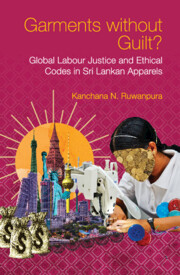Book contents
- Frontmatter
- Dedication
- Epigraph
- Contents
- List of Tables, Figures and Images
- Preface and Acknowledgements
- Published Works and Funding
- List of Abbreviations
- 1 Introduction: Global Labour Justice via Ethical Codes?
- 2 Labouring for Apparels: Labour Geographies and Feminist Inflections
- 3 Fieldwork: Prolonged Phases and Multiple Moments
- 4 Clothing the World – Guilt Free? Sri Lanka’s Apparel Landscape
- 5 Neglected Labour Histories: The Sri Lankan State Responds to Labour
- 6 Ethicality with a Blind Eye? Ethical Code Practices at Production Sites
- 7 From War to Work: Ethicality amidst Post-War Trauma?
- 8 Concluding Thoughts: Grounded Governance?
- Appendix
- References
- Index
2 - Labouring for Apparels: Labour Geographies and Feminist Inflections
Published online by Cambridge University Press: 15 December 2021
- Frontmatter
- Dedication
- Epigraph
- Contents
- List of Tables, Figures and Images
- Preface and Acknowledgements
- Published Works and Funding
- List of Abbreviations
- 1 Introduction: Global Labour Justice via Ethical Codes?
- 2 Labouring for Apparels: Labour Geographies and Feminist Inflections
- 3 Fieldwork: Prolonged Phases and Multiple Moments
- 4 Clothing the World – Guilt Free? Sri Lanka’s Apparel Landscape
- 5 Neglected Labour Histories: The Sri Lankan State Responds to Labour
- 6 Ethicality with a Blind Eye? Ethical Code Practices at Production Sites
- 7 From War to Work: Ethicality amidst Post-War Trauma?
- 8 Concluding Thoughts: Grounded Governance?
- Appendix
- References
- Index
Summary
Oba thireyan thamai kamhale behivune.
(Striving in the factory to attain prosperity for it.)
—AnuIntroduction
This line from Anu's poem to me captures the essence of labour geography. It was a poem pinned against one of the walls in the canteen of a production site where I was doing fieldwork. The creative wall, as it was called, was vividly colour-washed in orange and was a strip that everyone encountered upon entering the canteen. It was an initiative introduced by a recently recruited HR manager, where workers were invited to post their artwork, poems, verses, short stories and such. One day, the poem caught my eye. I learnt that these creative works were rotated on a monthly basis to make way for others. Later, I approached the worker who penned these verses and inquired if I might have them to use for my research. I let her know that, if I were ever to use her poem in my writings, she would be acknowledged. She was bemused by my request: She was ambivalent about her work's poetic value and so wondered if I was in earnest. I had to assure her that I did find the poem powerful and effective. This is how I came to obtain a copy of the poem, while I encouraged her to retain the original.
I had not used this poem before in my writings. Yet, as I returned to my field diaries and collections, I was reminded that it remained a poignant and powerful effort to capture the essence of labour geographies; without the worker, firms would not exist. Even as her entire poem entitled Lovingly, To You, tenderly captures the challenges and hardships of working in the apparel sector, she also reminds her co-workers that without them or us, the factories simply would not exist. They, the workers, make an important contribution to the nation's wealth. Her poem then is a tender call for recognizing their agency.
Through the entirety of the poem, Anu invokes the importance of workers to the country and the firm. Her verses are a stimulating way of combining two important theoretical strands – feminist interventions and labour geographies literature – which are pertinent for thinking about labour geographies within the context of the Sri Lankan apparel sector.
- Type
- Chapter
- Information
- Garments without Guilt?Global Labour Justice and Ethical Codes in Sri Lankan Apparels, pp. 13 - 27Publisher: Cambridge University PressPrint publication year: 2022



